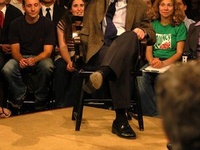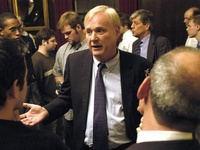Though he appeared on CBS and ABC as a commentator while he was Washington bureau chief for the San Francisco Examiner, Matthews made the jump to TV host amidst the cable news explosion of the mid-1990s. He joined the then-seven-year-old CNBC in 1995, while Fox News and MSNBC were still in development.
Media critics have bemoaned the profusion of “soft news” and “infotainment”—the blurring of the line between news and entertainment—in the era of 24-hour news channels, but Matthews says that line never existed.
“All news is entertainment,” he says. “Reading and watching the news is what you do for enjoyment. What other motive would there be?”
Nevertheless, Matthews acknowledges that cable news channels have changed the media landscape, because viewers are now inundated with information that is part opinion, part analysis and part news.
“It’s 24/7 and it’s a lot more product, a lot more time, a lot more attitude,” he says. “Almost all cable is attitude.”
But that doesn’t mean it isn’t demanding for viewers—“Nobody can be casual watching Hardball,” he says—and he says it challenges him, too.
“I never know what to ask and I try to get the right questions, and the candidates never like them,” Matthews says. “They want speech cues.”
Gergen says the Hardball host’s skill is pushing interview subjects, especially political candidates, “off of their 3x5s”—i.e., index cards with prepared responses.
“I think he often gets people beyond the standard political pap, to where they live,” he says.
Matthews accomplishes this with an understanding of issues that allows him to confront his guests, according to Dawn Birch, stage manager of the “Battle for the White House” series.
“He really knows what he knows, and he really knows what he knows well—that’s why it becomes hardball,” she says.
The interview with Clark allowed Matthews to display his best skill, Gergen says—his aggressiveness.
Gergen pointed to Matthews’ pressing of Clark about his removal from the post of Supreme Commander of NATO forces in Europe. Matthews suggested Clark was fired—the general would say only that he was asked to step down three months early because of “politics.”
“There you saw Chris Matthews at his best—aggressive pursuit of the story,” Gergen says.
Passion, Not Partisanship
Read more in News
Black Female Alums Celebrate Third Decade














